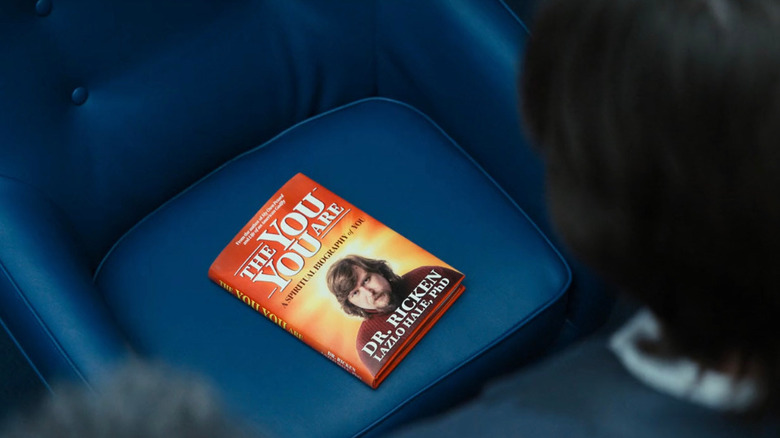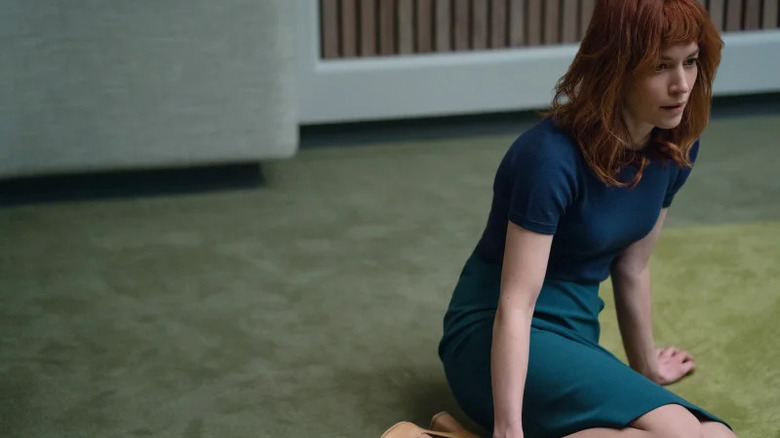The Philosophy Of Severance: Consciousness And Theories Of The Self
Spoilers for "Severance" follow.
"Severance," the tale of the multifaceted employees of a mysterious company, made audiences ask themselves a lot of mind-bending questions. The ambiguously timed and highly stylized science fiction series posits a world where people can be "severed," meaning they can insert an implant that allows them to have two sets of memories: one while they're at work and one while they're at play. The series forces viewers to chew on all kinds of philosophical questions. Questions about ethics, the creation and destruction of life, and the definition of the person. Dan Erickson's series is playing philosophy games, peppering in nuggets about the four humors, dabbling with theology, and most clearly, building on theories of the self.
The show wears its philosophical inspirations on its business casual sleeves. "What, indeed, is 'you'?" Ricken (Michael Chernus) reads from his self-help book about personhood and the worker/employer relationship. The book is "a spiritual biography of you" that asks philosophical questions about the definition of personhood as it relates to a person's identity as an employee. This is the exact theme of the series itself. Exploring the metaphysical concept of the self, the show plays games by smashing together theories and allowing the characters to hold different concepts of personhood, showcasing the ambiguity of these mind-bending ideas.
"Theories of the self" or "Personal Identity" is one of the facets of metaphysics, a branch of philosophy concerned with the fundamental nature of reality. The study asks, what defines the "self"? What features define a person? Guys like John Locke, Bernard Williams, Buddha, and John Noon tackled this philosophical problem, one that seems to be addressed by science fiction media. There's a natural pairing of philosophy and science fiction, since sci-fi is often a narrative manifestation of thought experiments. (You've probably heard of a thought experiment before. "The Trolley Problem" is a popular favorite among ethicists and mentioned all over "The Good Place.") "Severance" takes on the study, which tries to decipher whether our consciousness or our body is what makes us...us.
What, indeed, is 'You'?
There are multiple prevailing theories in this space, but there are two major categories: is the self defined by the consciousness, or by the substance? Are you your mind or are you your body? If we ask the movies, it seems to be the self is defined as the consciousness. We use the word "body swap" to describe movies like "Freaky Friday" that involve two people's consciousnesses switching physical bodies. In "The 6th Day," clones are imbued with copies of consciousness, forcing us to ask which copy is the real Adam (Arnold Schwarzenegger). But "Severance" adds a twist to these ideas. The show asks us to posit a world where two separable consciousnesses populate the same physical body and then asks us to decipher our thoughts on personhood.
To ask ourselves how we define personhood, let's borrow and play with some thought experiments philosophers used to try and decipher the answer. First, there's "the cheap trip," which is a riff on a thought experiment created by Derek Parfit (though also postulated earlier by Stanislaw Lem). Imagine you were traveling to Mars. You have two options: you can pay a lot of money to take a rocket to Mars. Alternatively, for much less money, you could have your consciousness copied and sent to your cloned body on Mars, and then have your Earth body killed. Which trip would you take? The idea is that based on your choice, you've either decided whether you think your "self" is your physical body or your consciousness. (The original experiment involved teleporting your bodily particles and putting them back together on Mars to test if one favored the body as the self). Though, of course, it's hard to isolate the fear of your Earth body being destroyed, the transporter from "Star Trek," or the plot of "The Prestige," tap into the idea that we might take the cheap trip and favor the consciousness.
Media like "Hemlock Grove," and "Moon," built on this experiment by adding another variable: what if you met your Mars body before your Earth body was killed? In these examples, we might start to question which is the more real self, or if there can be two co-existing versions of the same person that have been split into two separate people as they collect new experiences. "Severance," by dropping in a severed version of a presumed dead woman, Ms. Casey (Dichen Lachman), could be revealed to be tapping into these ideas of a new consciousness and a new body and what that means if this character is truly Mark's wife, Gemma.
The self and the future
Another thought experiment comes from Bernard Williams who took liberties with the idea of consciousness and continuity of psychology. In one of his thought experiments, he asks someone to suppose that they will have their memories erased and then be tortured. He then asks, is there any reason to be afraid? If consciousness defines the self, then there's no reason to fear the impending torture since your consciousness will be erased first. If you do still fear the impending torture, you might be favoring the body as an expression of the self. Williams' experiment seems to reflect the journey of Helly R. and her outie, Helena (Britt Lower). After Helly begs to be released from the Lumon created hell, Helena rejects her. As revealed in the finale, Helena is a part of Egan's pitch for the benefits of severance, and to her, Helly is a separate person experiencing torture that has no effect on Helena herself. The same goes for the suggestion that pregnant people are severing themselves to avoid the experience of childbirth. (This is perhaps in contrast to the others who find "wellness" in learning of the happiness of their outies).
"Severance" has built on philosophical theories to posit a world where two consciousnesses create two coexisting people in one body. Most of the philosophy in this area has considered either a single consciousness or a fleeting one. "Severance" seems to be intentionally playing with philosophy by adding more science fiction layers to these thought experiments to force us to consider metaphysics and ethics. The innie and the outie are created as two different characters, so distinguishable from each other that Helly barely recognizes who she sees when watching her outie, and Mark S. (Adam Scott) has a completely different swagger and opinion about his brother-in-law. Each "Mark" has a different collection of memories and experiences, and thus, feels like a separate person.
More fun than playing with the audience's take on the self, the characters of "Severance" also struggle with the definition of personhood. "He lost his wife. You lost your wife," Devon (Jen Tullock) utters to her brother's innie. When learning of Burt's (Christopher Walken) retirement, Irving (John Turturro) laments that his lover is being killed. "I cried in my bed when they told me what she did to you," James Egan (Michael Siberry) says to his granddaughter about the action of her innie.
"What, indeed, is 'you'? How can 'you' mean so many different things to millions of readers around the vast world?" It's a valid question, Ricken asks, one tackled by years of philosophical academia, science fiction movies, and the characters of "Severance."


